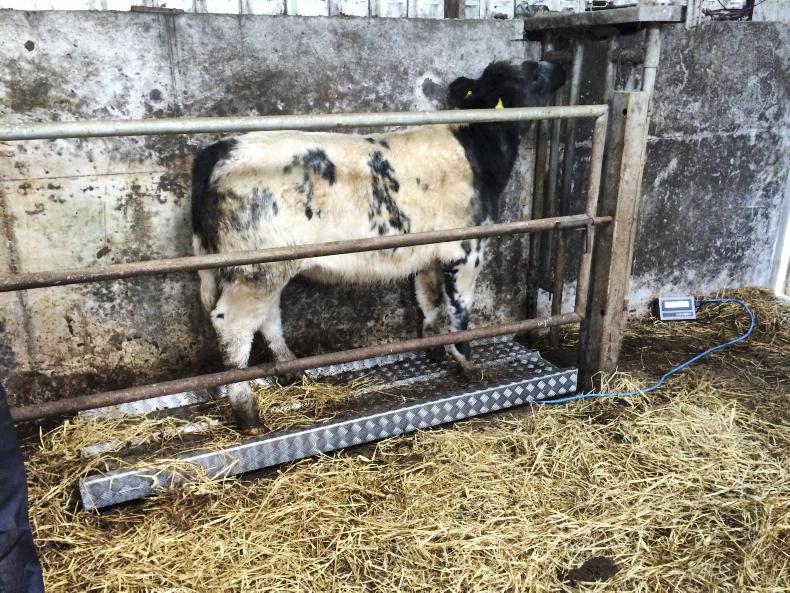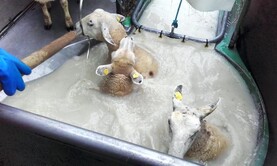The Irish Cattle Breeding Federation (ICBF) is reporting the largest number of beef calf weighings on farms in Ireland to date in 2021. The number of weight records has been on a rising curve in recent years and is underpinned in the main by mandatory weight recording in the Beef Environmental Efficiency Programme – Suckler (BEEP-S).
Up to mid-August, 8,086 herds from 27,271 participating in the programme submitted weights. Within this, there were 140,893 valid weights recorded for cow-calf pairs.
There were also a significant number of ineligible weights recorded from a combination of eligible calves that did not have a related cow weight, ineligible animal weights such as calves born outside the eligible window (1 July 2020 to 30 June 2021) or birth weights which are good to record but will not satisfy the requirements of the programme.
Optimum weighing date
The optimum time frame identified by the ICBF to weigh calves is between 150 and 250 days of age (five to eight months of age). This will give the best indication of dam performance relating to milk yield.
Table 1 is a useful guide as to the optimum time to weigh based on birth dates.
The requirement is for each unweaned calf and its dam to be weighed on the same day.
This is a good blueprint to follow irrespective of whether you are participating in the programme as it will also feed in to the potential of obtaining a cow efficiency figure.
This figure is typically a measure of a calf weight at 200 days (a calculation carried out by the ICBF will correct for age) calculated as a percentage of the cow’s own weight.
For me, it is not a figure to get too hung up about in terms of striving to reach a target of 45% to 50% as the liveweight of the calf also has to be taken in to account.
Personally, I would rather a calf weighing 280kg at 43% efficiency than a 240kg calf and a 40% efficiency figure. It is a useful figure, however, within herds to gauge the performance of cows with similar management against each other.
Scales registration
Another issue highlighted by the ICBF is weights (635 cow-calf pairs) being recorded on a small number of farms where scales have not been registered.
On some of these farms, scales were registered for the 2020 programme but it is important to note that scales must be registered again for the 2021 programme year.
ICBF portal
Scales can be registered through the ICBF portal. Note that you will need the make/model of the scales, the year of purchase and the serial number to register the scales.
Where a scales is being borrowed, then the owner of the scales will receive a text when it is used for weighing by a third party.
The ICBF recommends that it is good practice in ensuring accuracy of weighing to place a test weight on the platform before you start.
Items such as bags of fertiliser or meal where the weight is known will work well. The ICBF advises to place the item at one end of the platform and read the weight and then repeat the practice for the other end of the scales.
According to the ICBF, there should be no more than 1kg difference between both ends of the scales. If the test weight differs from the expected weight or there is a discrepancy of more than 1kg between both ends of the platform, then you should contact the rental depot in the case of rented scales or the manufacturer of the scales.
There are a number of practices that should also be adopted to ensure weights are not collected inaccurately due to issues such as animals resting on anti-backing gates, crush bars, etc. Table 2 details useful tips when weighing.
From 1 May 2021, all weights should be submitted within seven days of weighing and no later than 1 November 2021. Mart weights will not suffice for the scheme.
Weights can be recorded online through the ICBF website, ICBF weight recording app, farm software and any third-party applications linked to the ICBF database.
Where recording weights online through a computer or app is not an option, you can submit weights through paper forms which can be posted on request by calling 023- 883 2883. Hard copy forms can also be printed of the ICBF website to facilitate easier recording.
Dairy Beef Calf
Programme
There were 8,185 applications submitted under the Dairy Beef Calf Programme in 2021. The pilot programme offers a €20 payment per eligible calf weighed, with a maximum payment of 20 calves or €400 per head. This means that if each herdowner who submitted an application draws down the maximum payment, there will be a mandatory weight recording of up to 163,700 calves. Many farmers weighing calves will have a greater number of calves than the payment figure of 20 calves and, as such, there is the potential for up to 245,349 weights to be recorded.
Participants in the scheme must weigh a minimum of five eligible calves, with weights submitted to the ICBF.
Weights should be submitted within seven days of weighing and no later than 1 November 2021. Weights must be received by 5.30pm on 1 November if submitted by any of the recording options, including the ICBF website, ICBF weight recording app, farm software and any third-party applications linked to the ICBF database. Eligible calves are those born on or after 1 January 2021, that are male calves of a dairy breed, and/or male or female calves sired by a beef breed sire born to a dairy breed dam.
Calves must be at least 12 weeks of age at the time of weighing, in ownership of the applicant and registered on the holding on which weighing takes place for a minimum of 10 days prior to weighing.
The Irish Cattle Breeding Federation (ICBF) is reporting the largest number of beef calf weighings on farms in Ireland to date in 2021. The number of weight records has been on a rising curve in recent years and is underpinned in the main by mandatory weight recording in the Beef Environmental Efficiency Programme – Suckler (BEEP-S).
Up to mid-August, 8,086 herds from 27,271 participating in the programme submitted weights. Within this, there were 140,893 valid weights recorded for cow-calf pairs.
There were also a significant number of ineligible weights recorded from a combination of eligible calves that did not have a related cow weight, ineligible animal weights such as calves born outside the eligible window (1 July 2020 to 30 June 2021) or birth weights which are good to record but will not satisfy the requirements of the programme.
Optimum weighing date
The optimum time frame identified by the ICBF to weigh calves is between 150 and 250 days of age (five to eight months of age). This will give the best indication of dam performance relating to milk yield.
Table 1 is a useful guide as to the optimum time to weigh based on birth dates.
The requirement is for each unweaned calf and its dam to be weighed on the same day.
This is a good blueprint to follow irrespective of whether you are participating in the programme as it will also feed in to the potential of obtaining a cow efficiency figure.
This figure is typically a measure of a calf weight at 200 days (a calculation carried out by the ICBF will correct for age) calculated as a percentage of the cow’s own weight.
For me, it is not a figure to get too hung up about in terms of striving to reach a target of 45% to 50% as the liveweight of the calf also has to be taken in to account.
Personally, I would rather a calf weighing 280kg at 43% efficiency than a 240kg calf and a 40% efficiency figure. It is a useful figure, however, within herds to gauge the performance of cows with similar management against each other.
Scales registration
Another issue highlighted by the ICBF is weights (635 cow-calf pairs) being recorded on a small number of farms where scales have not been registered.
On some of these farms, scales were registered for the 2020 programme but it is important to note that scales must be registered again for the 2021 programme year.
ICBF portal
Scales can be registered through the ICBF portal. Note that you will need the make/model of the scales, the year of purchase and the serial number to register the scales.
Where a scales is being borrowed, then the owner of the scales will receive a text when it is used for weighing by a third party.
The ICBF recommends that it is good practice in ensuring accuracy of weighing to place a test weight on the platform before you start.
Items such as bags of fertiliser or meal where the weight is known will work well. The ICBF advises to place the item at one end of the platform and read the weight and then repeat the practice for the other end of the scales.
According to the ICBF, there should be no more than 1kg difference between both ends of the scales. If the test weight differs from the expected weight or there is a discrepancy of more than 1kg between both ends of the platform, then you should contact the rental depot in the case of rented scales or the manufacturer of the scales.
There are a number of practices that should also be adopted to ensure weights are not collected inaccurately due to issues such as animals resting on anti-backing gates, crush bars, etc. Table 2 details useful tips when weighing.
From 1 May 2021, all weights should be submitted within seven days of weighing and no later than 1 November 2021. Mart weights will not suffice for the scheme.
Weights can be recorded online through the ICBF website, ICBF weight recording app, farm software and any third-party applications linked to the ICBF database.
Where recording weights online through a computer or app is not an option, you can submit weights through paper forms which can be posted on request by calling 023- 883 2883. Hard copy forms can also be printed of the ICBF website to facilitate easier recording.
Dairy Beef Calf
Programme
There were 8,185 applications submitted under the Dairy Beef Calf Programme in 2021. The pilot programme offers a €20 payment per eligible calf weighed, with a maximum payment of 20 calves or €400 per head. This means that if each herdowner who submitted an application draws down the maximum payment, there will be a mandatory weight recording of up to 163,700 calves. Many farmers weighing calves will have a greater number of calves than the payment figure of 20 calves and, as such, there is the potential for up to 245,349 weights to be recorded.
Participants in the scheme must weigh a minimum of five eligible calves, with weights submitted to the ICBF.
Weights should be submitted within seven days of weighing and no later than 1 November 2021. Weights must be received by 5.30pm on 1 November if submitted by any of the recording options, including the ICBF website, ICBF weight recording app, farm software and any third-party applications linked to the ICBF database. Eligible calves are those born on or after 1 January 2021, that are male calves of a dairy breed, and/or male or female calves sired by a beef breed sire born to a dairy breed dam.
Calves must be at least 12 weeks of age at the time of weighing, in ownership of the applicant and registered on the holding on which weighing takes place for a minimum of 10 days prior to weighing.






 This is a subscriber-only article
This is a subscriber-only article











SHARING OPTIONS: